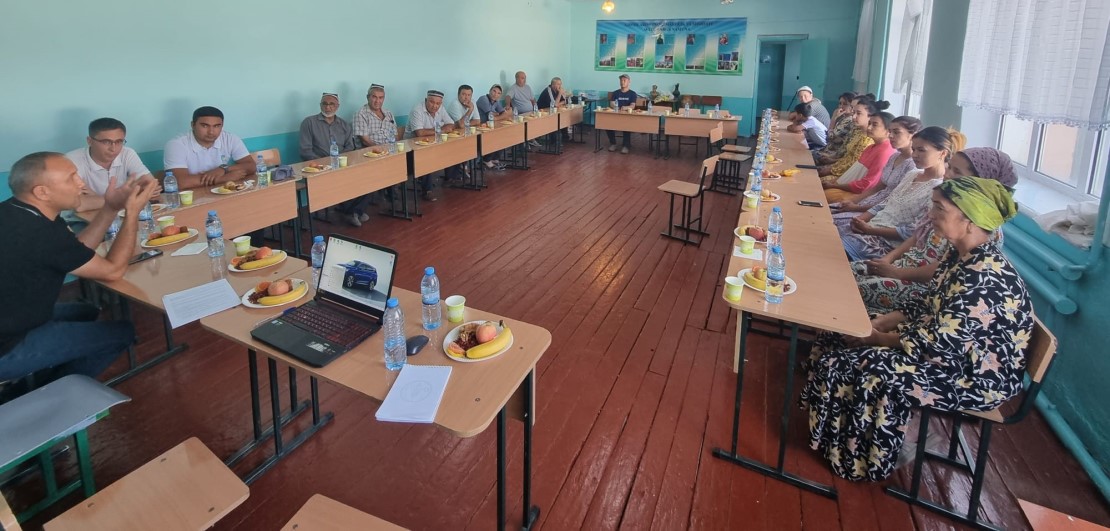In the verdant expanse of Uzbekistan's Fergana region, where the fertile soil meets the horizon in a tapestry of vibrant greens, farmers have long toiled in a landscape rich in tradition and agricultural heritage. Yet, behind this picturesque facade lie issues that threaten the livelihoods of those who call this region home. From the bustling markets of Fergana to the tranquil villages of Novkent and Yuksalish, farmers face numerous challenges, ranging from water scarcity and knowledge gaps to pesticide management and fluctuating market prices. Amid these trials, a beacon of hope has emerged in the form of Living Labs – a collaborative innovative approach to problem solving poised to revolutionize agricultural practices, empower local stakeholders and nurture sustainable solutions tailored to the unique needs of the Fergana farming community.
This innovative approach comprises elements of stakeholder engagement, co-creation, a focus on innovation, and integrated monitoring and evaluation systems. It is characterized by being bottom-up and farmer-centred, tailored to addressing complex challenges while considering local conditions. Its inclusivity and potential for early-stage upscaling contribute to its success.
In the Fergana region, Living Labs emerged as part of an FAO project aimed at fostering innovation and digitalization in agriculture, in alignment with a national decree on agricultural knowledge and innovation systems. Two Living Labs took root – one focusing on beekeeping and pollination, and the other on water management in greenhouses. Both served as instruments for co-innovation and the development of practical solutions aligned with farmers' needs.
A diverse array of initiatives emerged to address pressing agricultural challenges from among the co-created solutions within Uzbekistan's Living Labs. The beekeeping and pollination Living Lab determined the levels of harmful pesticides in cotton honey, beeswax, comb and pollen, and international experts collaborated in analysing samples and providing recommendations for policymakers and cotton farmers on pesticide use. Additionally, initiatives were undertaken to facilitate cheaper group training for issuance of driving licences, lowering of sugar prices through engagement with the Ministry of Agriculture and diversification of honey-derived and bee-based medicinal products and soap in collaboration with pharmaceutical companies.


The Novkent Living Lab focuses on water management in greenhouses. Demonstrations of its drip irrigation systems were organized through the Smart Farming project, highlighting innovative solutions for improvement of water efficiency in agricultural practices. These co-created solutions reflect a concerted effort by diverse groups of stakeholders to address multifaceted challenges and foster sustainable agricultural practices in Uzbekistan.
The implementation of Living Labs in Fergana involved various steps, starting with a needs assessment, followed by stakeholder identification and activity organization, concluding with a monitoring and evaluation cycle.
Needs assessments revealed challenges such as water management, knowledge gaps, greenhouse heating, crop diversification, seed quality and soil health. Stakeholders, including farmers, industry representatives, academia and governmental bodies, actively took part in Living Lab activities, which included meetings, innovation fairs, field visits and demonstrations.
International experts also played a crucial role, offering insights and solutions through online meetings and discussions that addressed challenges such as pesticide management, pollination services and water shortages – 92 percent of farmers in Novkent experience issues with water.
Lastly, monitoring and evaluation sessions supplied valuable insights and lessons learned, emphasizing the importance of continuous engagement and skilled facilitation for the success of Living Labs. The sustainable use of the Living Labs approach is now embedded in the regional Agricultural Knowledge and Innovation System (AKIS) strategy and the key function of coordinating the efforts was assigned to the regional AKIS Center in Fergana. Based on these experiences and the lessons learned, there is potential to upscale and replicate these initiatives at regional and local levels in Uzbekistan, considering the socioeconomic and cultural contexts and the innovation ecosystem.
Living Labs offer a promising pathway for collaborative innovation in Uzbekistan's lush agricultural landscape, fostering sustainable solutions tailored to local needs and conditions.
Learn more
- Smart Farming in Uzbekistan
- Living labs in Novkent, Yuksalish and Lolazor Digital Villages
- Smart Farming in Uzbekistan-Affordable Technologies and Efficient Techniques Transform Rural Communities
- Learn about building virtual innovation labs: putting virtual labs into action
- Living labs definition on Wikipedia
- Creating innovative agricultural advisory services through a Living Lab
Living Labs, by definition, are collaborative innovation ecosystems where real-world experiments tackle societal challenges and foster innovative solutions. They integrate diverse stakeholders, including end-users, researchers, policymakers, and industry partners, in a participatory and creative process. These Labs emphasize co-creation, rapid prototyping, testing, and scaling up innovations and businesses, providing joint value to stakeholders involved.
The engagement of non-researchers, particularly farmers, is deemed crucial in Living Labs as they offer diverse knowledge complementary to researchers, fostering a respectful and enriching co-creation environment.
Living Labs have been identified as a valid method of bringing together diverse stakeholders, including end-users, researchers, private sector organizations and policymakers, to collectively address pressing development challenges. The approach has been successfully implemented in Novkent and Yuksalish, two rural communities in Uzbekistan, and in the village of Lolazor of Tajikistan, as FAO’s first pilot Digital Villages in these countries. In Uzbekistan, Living Labs have led communities to collaborate in the identification and testing of innovative solutions to such critical issues as water scarcity, plant disease, climate change and production challenges. In Tajikistan, three thematic Living Labs have been organized focused on agri-entrepreneurship, livestock and pasture management, and access to funding through small grant programmes for individual farmers and women entrepreneurs. By employing co-exploration, co-design, and co-experimentation approaches, the participants of the Labs identified the main challenges they faced, and developed innovative business ideas and social projects aimed at tackling agricultural and livelihood issues.
